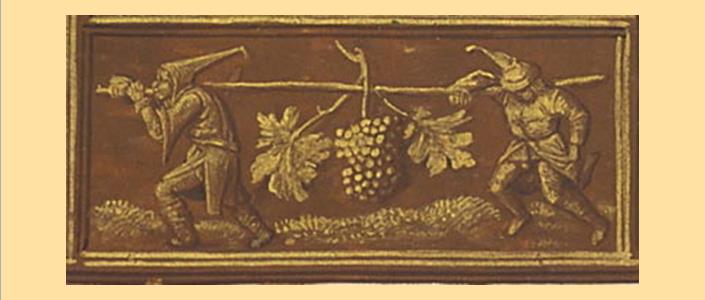Ruach HaYam Teaching at Congregation Eitz Chayim, 136 Magazine Street, Cambridge, MA – July 19, 2018. (Scroll to end for logistics)
Banner: The Spies Return from Canaan Carrying a Large Bunch of Grapes (miniature on vellum by a follower of Simon Bening from a 1500–1525 Southern Netherlands Book of Hours). Two men in conical caps with a gigantic bunch of grapes suspended from a pole that they carry between them.
This study, led by Penina Weinberg, is about having a different spirit and struggling with(in) the strictures of sacred norms. We will read and study Parashat Sh’lach (Numbers 13.1 – 15:41) .
As the children of Israel are poised to enter the promised land, Moses sends out 12 men to investigate. 10 spies come back with an evil report of the land, about giants to be found there, and about a land that eats its inhabitants. One of them, Caleb, is the first to see what a disaster this report is. His stance is diametrically opposed to that of his fellow spies, and it appears that he undertakes, one person, to stand against the entire community, who are quaking in fear. Furthermore, Caleb makes a mighty attempt to quiet the people towards Moses, pleading with them to understand that they can well possess the land.
God commends Caleb for having “ruach acheret,” a “different spirit.” While God sets a plague on all the 10 spies, and prevents the entire adult generation from entering the land of Canaan, God allows Caleb to enter, along with Moses’ heir apparent, Joshua.
What is this “different spirit?” In what way is Caleb’s leadership at odds with standard norms (and different from Joshua’s)? What are the implications for queer Jews who don’t fit established norms? Does God possess ruach acheret and in fact model ultimate queerness?
We will keep in mind the teaching of Joy Ladin, which we read at an earlier class:
“Wherever we travel in the Jewish world, we can see the positive effects of efforts to bring human laws, lives, and communities into line with divine standards of justice and loving-kindness. But those who don’t fit communal norms know the downside of this ideal: its tendency to cast an aura of sanctity over flawed and even oppressive social structures and to frame efforts to make communal norms more inclusive as threats to the essence and existence of the community……The emphasis on sacred normativity in Judaism and the Jewish community harms those, like LTBTQ Jews, who don’t fit established norms. It also harms the Torah by obscuring the queerness on which its moral and spiritual vitality depend.”
Ladin, Joy. “Both Wilderness and Promised Land: How Torah Grows When Read Through LTBTQ Eyes.” Tikkun 29, no. 4 (Fall 2014): 17–20.
Penina Weinberg is an independent Hebrew bible scholar whose study and teaching focus on the intersection of power, politics and gender in the Hebrew Bible. She has run workshops for Nehirim and Keshet and has been teaching Hebrew bible for 10 years. She has written in Tikkun and HBI blog, and is the leader and founder of Ruach HaYam.
** Logistics**
Study starts promptly at 7:15 pm. We open the doors at 6:45 for schmoozing. Feel free to bring your own veggie snack for the early part. A parking consideration is in effect for the three blocks around EC during all regularly scheduled events. It is a good idea to put a note in the windshield that you are attending an event at EC.
Accessibility information: all gender/accessible bathrooms, entry ramp.
Ruach HaYam study sessions provide a queer Jewish look at text, but are welcoming to any learning or faith background, to all bodies, and friendly to beginners.
